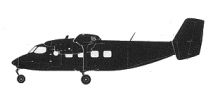
ASN Wikibase Occurrence # 318966
| Date: | Friday 16 July 2021 |
| Time: | 16:11 |
| Type: |  Antonov An-28 |
| Owner/operator: | SiLA - Siberian Light Aviation |
| Registration: | RA-28728 |
| MSN: | 1AJ007-13 |
| Year of manufacture: | 1989 |
| Total airframe hrs: | 8698 hours |
| Cycles: | 5921 flights |
| Engine model: | Glushenkov TVD-10B |
| Fatalities: | Fatalities: 0 / Occupants: 19 |
| Aircraft damage: | Substantial |
| Category: | Accident |
| Location: | 52 km SE of Kedrovo -
 Russia Russia
|
| Phase: | En route |
| Nature: | Passenger - Scheduled |
| Departure airport: | Kedrovo Airport |
| Tomsk-Bogashevo Airport (TOF/UNTT) | |
| Investigating agency: | MAK |
| Confidence Rating: |
An Antonov An-28 airplane flipped over during a forced landing between Kedrovo and Tomsk, Russia. All aboard survived the accident.
According to a preliminary report, published by the Interstate Aviation Committee, the captain made ten flights in a row and worked for 18 hours and 5 minutes, of which six hours flying time. After that, the crew went to a hotel at the Abakan Airport, and two hours later they got down to work again. According to the rules, they had to rest for at least 18 hours.
While en route between Kedrovo and Tomsk, icing caused both engines to shut down almost simultaneously. It was not possible to restart them.
Conclusion:
The accident of the An-28 aircraft, registration RA-28728, occurred during a forced landing on an improvised landing site due to the simultaneous shutdown of both engines while in flight. The need for this landing was triggered by the engines' spontaneous shutdown. The shutdown occurred while the aircraft was flying in icing conditions with the Pitot-Static System (POSS) turned off due to ice ingestion into its air intake.
The aviation incident was most likely influenced by the following factors:
- The crew's failure to follow the Aircraft Flight Manual (AFM) procedures for manually activating the POSS when meteorological conditions favored icing.
- Violation of the crew's duty and rest time regulations, which could have led to the accumulation of operational fatigue and contributed to missing the operation to activate the POSS.
- The crew's failure to make the decision to cease further performance of their duties due to the accumulation of operational fatigue in the absence of the airline's established procedures for exercising this crew right, which does not comply with the provisions of the Russian Ministry of Transport Order No. 139 dated November 21, 2005, "On Approval of the Regulation on Features of the Work and Rest Time Regime for Crew Members of Civil Aviation Aircraft in the Russian Federation."
- Increased hypoxic stress when flying at altitudes exceeding 3000 meters without the additional use of oxygen, which is a violation of the regulations of FAP-128, AFM, and the airline's internal regulations, and could have exacerbated the negative effects of operational fatigue.
- A malfunction in the ice detection sensor DSL-40T, which prevented the issuance of ice detection alerts and the automatic activation of the POSS.
Accident investigation:
 |
|
Sources:
tass.ru
MAK
Investigative Committee of the Russian Federation
Location
Images:

photo (c) Investigative Committee of the Russian Federation; near Kedrovo; 16 July 2021

photo (c) MAK; near Kedrovo; July 2021

photo (c) MAK; near Kedrovo; July 2021

photo (c) MAK; near Kedrovo; July 2021

photo (c) Igor I Savin; Belokurikha; 06 January 2021; (CC:by-sa)
Revision history:
| Date/time | Contributor | Updates |
|---|
The Aviation Safety Network is an exclusive service provided by:


 ©2024 Flight Safety Foundation
©2024 Flight Safety Foundation